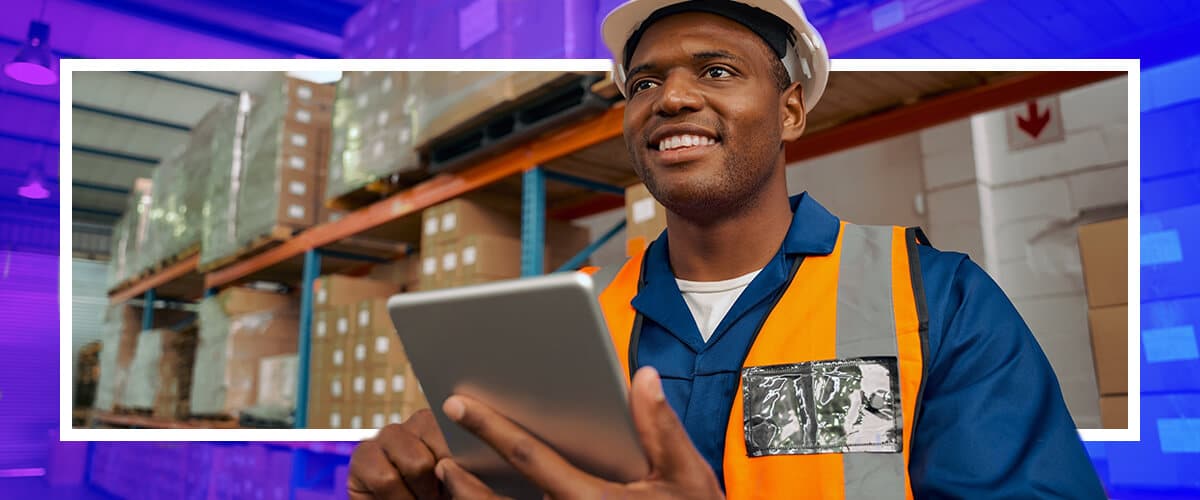In this article, we’ll examine the role of AI in order fulfillment software and how it’s transforming warehousing processes from start to finish. We’ll start by giving an overview of AI in order fulfillment, then show how the latest innovations in AI tech have shaped our fulfillment management solution, Logiwa IO. Next, we’ll take a look at some specific functionalities that our AI-driven order fulfillment software offers, such as directed putaway and picking algorithms, and discuss how AI has enhanced warehouse automation as a whole. Lastly, we’ll look at the future of AI in order fulfillment technology and how Logiwa is turning it into reality.
Artificial intelligence in warehouse management
Order fulfillment software has transformed every phase of both supply chain and warehousing processes, and AI has only elevated the software’s capabilities. Here’s how AI has impacted the order fulfillment industry, and how Logiwa IO has utilized AI in its groundbreaking fulfillment management solutions.
Overview of AI in order fulfillment
When it arrived on the scene, order fulfillment software turned the art of logistics into a science. It helped warehouse managers pivot away from trial and error decisions and traditional methods toward optimized processes that were rooted in data. For example, rather than having warehouse managers place inventory in the first available slot, AI-driven order fulfillment software can find the most efficient arrangement for even the most diverse set of SKUs and recommend the optimal picking method for your warehouse’s processes.
At the macro-level, logistics specialists use AI in warehouse inventory management to become more agile and resilient than ever. The predictive analytics models generated by AI and machine learning help companies anticipate abrupt changes in consumer demand and identify bottlenecks so that they can proactively address inefficiencies in their daily operations. The result is that companies are not only better equipped to adapt to changes faster—they can anticipate them before they ever occur.
Introduction to Logiwa IO
Logiwa IO is a leader in AI-driven order fulfillment. While some have hesitated to embrace AI technology, we’ve leveraged it to create a platform that reaches beyond the warehouse and covers all of your order fulfillment processes.
Since warehouse management systems (WMS) no longer suffice in today’s complex supply chain landscape, we’ve developed a fulfillment management system (FMS) that gives you end-to-end oversight into your order fulfillment processes. This centralized hub delivers omnichannel order fulfillment visibility, and uses advanced automation and integration to process and ship customer orders as quickly as possible. The result is clearer visibility into your entire order fulfillment operations, and greater efficiency at the warehouse and broader supply chain levels—and Logiwa IO’s commitment to AI integration makes it happen.
AI-driven directed putaway
Logiwa IO’s FMS platform focuses on large-scale order fulfillment processes, while leveraging AI to help operations managers optimize their workflows at the warehouse level as well. That includes automated directed putaway with AI—as well as several other on-the-ground processes.
Understanding Logiwa’s directed putaway
Picking and packing times, storage capacity, product damage rate—these are just a few factors that are impacted by an item’s location within a warehouse. Manual putaway processes can lead to inefficiencies such as longer shipment preparation and walking times, reducing your employees’ productivity. Inefficient putaway processes can also force employees to strain to reach products or walk unnecessarily far, potentially resulting in costly injuries.
Directed putaway seeks to optimize a warehouse’s layout by assigning a strategic location to each product. Also known as smart putaway algorithms, this AI-powered order fulfillment software functionality reduces best guesses and puts each inventory component in an optimized space, helping you maximize your warehouse efficiency.
Logiwa IO’s AI-powered directed putaway
Logiwa IO’s AI-powered directed putaway algorithms factor in a wide range of inputs, such as product turnover rates, inventory size, and storage needs, to find the best location for each SKU.
The benefits of this approach are:
- Less walking time
- Reduced congestion
- Fewer picking errors
- Fewer damaged products
Ultimately, Logiwa IO’s putaway algorithms improve your workers’ efficiency, and the efficiency of your warehouse as a whole.
AI-optimized picking algorithms
After optimizing a warehouse’s layout, managers can use WMS software’s AI-powered picking algorithms to help their employees take the most efficient route to fill orders. No more guessing at the Traveling Salesman and Shortest Path problems—AI-powered picking tools employ advanced algorithms created by renowned academics to solve your warehousing problem and maximize your picking efficiency.
The role of picking in fulfillment
Whether they’re humans or robots, pickers must travel long distances just to fill a single order. This lengthens order fulfillment times, delaying your shipping and creating bottlenecks in other parts of your processes. Many picking methods such as batch picking and wave picking have been devised to help workers grab inventory more efficiently, but determining which strategy is most effective can be a challenge—until you implement AI.
Enhancements through AI in Logiwa IO
Logiwa IO uses AI-powered picking algorithms to optimize picking paths and sequences, and the result is less travel time, lower labor costs, and faster order fulfillment. Our AI-driven job optimizations have had a real-world impact on throughput and productivity for our users—to the tune of a 58% increase in operational efficiency over manual operations.
Comprehensive warehouse automation with AI
Even after optimizing layout and picking methods, warehouse operations still involve many time-consuming and repetitive tasks. Such tasks are ideal for automation, and AI-driven order fulfillment software provides an interface for warehouse managers to automate workflows where possible. The result is not only greater throughput, productivity, and order accuracy, but higher cost savings and a workforce that’s free to complete more value-adding tasks.
The evolution of warehouse automation
Warehouses have increasingly been moving away from manual operations in favor of automated systems, but AI is empowering managers to go beyond basic mechanization. Autonomous vehicles and cooperative robots can be used to restock inventory periodically, and AI-powered predictive analytics can schedule audits, process orders, and anticipate how much inventory will be needed in seasons of fluctuating demand. Taken together, automation has moved beyond basic workflows and into complex warehouse management tasks.
Logiwa IO’s AI-integrated warehouse automation
When warehouse managers leverage Logiwa IO AI fulfillment solutions, they can take their automation to the next level. AI-enhanced warehouse efficiency enables better inventory management and more accurate order processing, and allows leaders to make difficult order fulfillment decisions in real-time.
The scalability and adaptability of AI-driven automation helps managers handle higher order volumes and fill more complex orders, leading to increased throughput, stronger productivity, improved order accuracy, and ultimately higher profitability.
Final thoughts on Logiwa IO’s contributions
Logiwa is a pioneer in the order fulfillment software industry. Our AI-driven solutions are transforming the future of order fulfillment by empowering businesses to optimize their warehousing processes. Integrating AI into their software can help managers stay competitive in the rapidly evolving order fulfillment market and deliver greater satisfaction to their customers, while those who stick with legacy processes risk falling behind.
Logiwa IO is constantly embracing advancements in AI technologies, and we’re setting new standards in order fulfillment as a result. Our FMS software ensures faster, more accurate, and cost-effective operations that meet the dynamic demands of today’s consumers.
Request a demo today to start implementing AI into your warehousing processes.
FAQs on AI in order fulfillment
How can I use AI in order fulfillment?
Warehouse managers can use AI in order fulfillment processes to:
- Select optimal storage locations
- Determine which picking method is most efficient
- Automatically reorder inventory at given intervals
- Reduce process inefficiency and human error
- Anticipate product demands based on historical data
How does AI-driven order fulfillment software improve my supply chain?
AI-powered FMS systems also strengthen your supply chain upstream by giving you better visibility over all your order fulfillment channels. This lets you better anticipate changes in market demand, identify bottlenecks in your supply chain, and optimize inventory levels before a disruption occurs.
How does AI-driven order fulfillment software improve my supply chain?
A few benefits of AI in order fulfillment are:
- More accurate demand forecasting, reducing stockouts and overstocks
- Faster picking, packing, and shipping times, making your warehouse more productive
- Greater order accuracy and less human error, helping achieve perfect order rates
- Higher customer satisfaction due to faster and more accurate shipping





